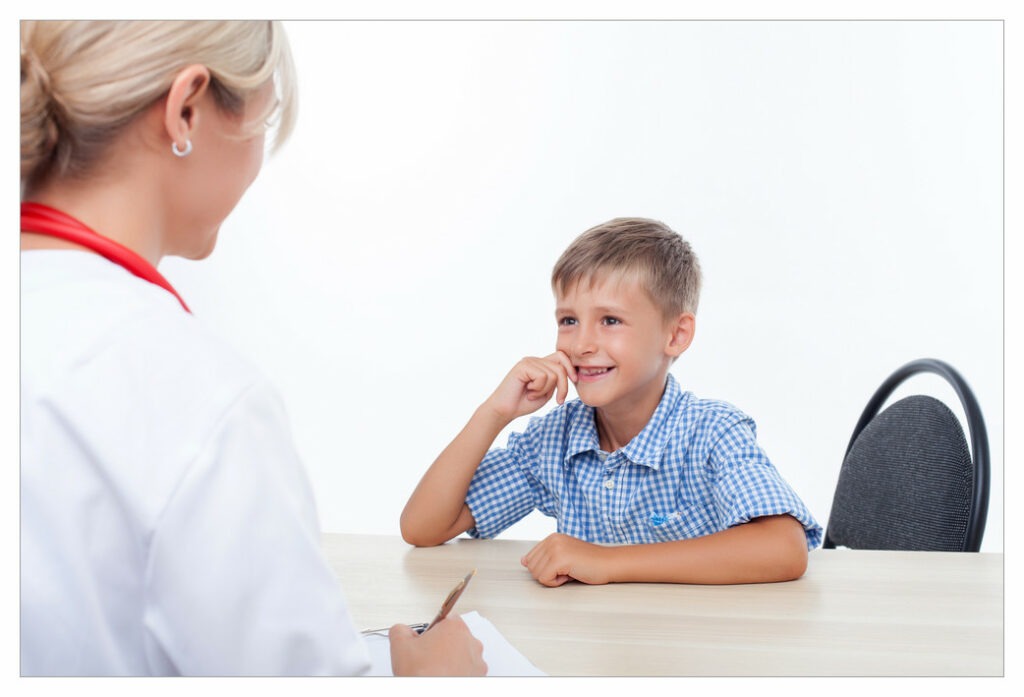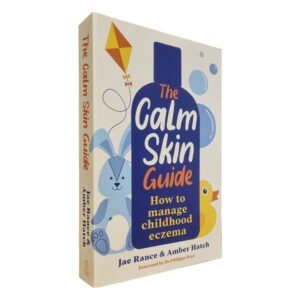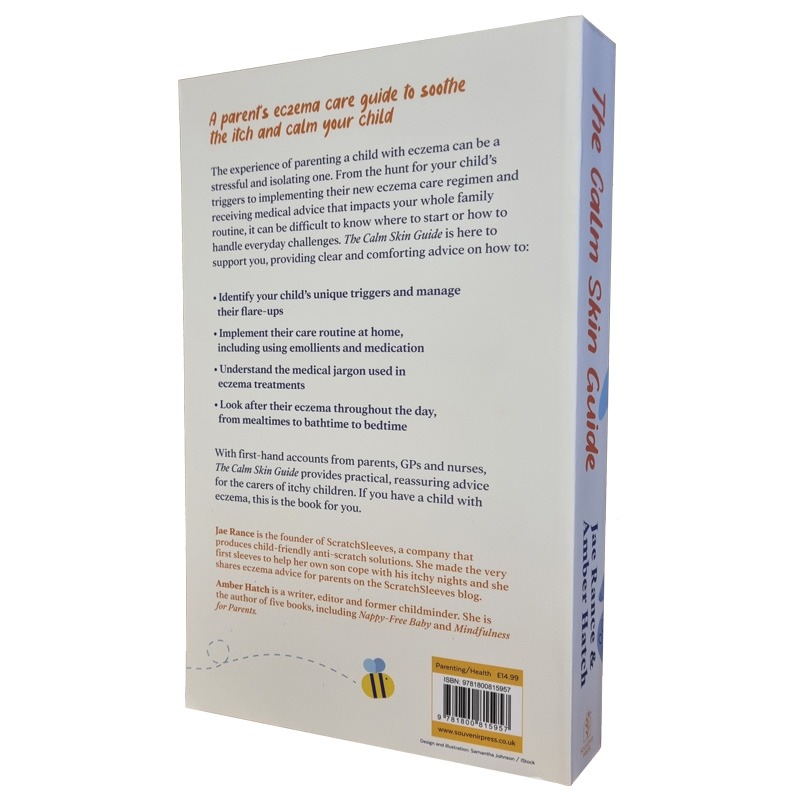Managing childhood eczema: Encouraging your child to take control



As a parent it’s natural to do all you can to try to relieve the symptoms of eczema. It’s awful to see your child suffer with itchy, red and inflamed skin. However, if their eczema continues to flare up as your child becomes older, you simply can’t be there all the time to manage the condition.
That means you’ve got to begin to shift at least some of the responsibility for managing eczema onto your child. Over time they can begin to learn how to take care of their eczema themselves. We know from experience how difficult this letting go can be. So we thought it would be helpful to share some tips and tricks that works for us. Hopefully these pointers can help you to start encouraging your child to take control of their eczema.
Why is it important to get your child to manage their own eczema?
In the early years of your child’s life, it’s likely you’ll know about every little bump and scratch that appears on their body. No eczema flare-up will escape your beady eye. But when they get to an age where you’re less involved in helping them bathe or change clothes you’ll have less awareness of how eczema is affecting them. We found it particularly noticeable when our son stopped holding hands as often. We no longer knew when the skin between his fingers was beginning to feel dry. And now he’s turned 8 he’s getting more and more independent. He gets himself washed and ready for bed by himself. This means that we don’t always spot the onset of a flare up.
While some children will grow out of their eczema, for others it will become a long-term condition. The earlier they start to understand how it affects them and how it can be managed, the better equipped they will be to minimise the impact. Although it may seem like a long way off, the secondary school and teenage years come round quickly. By then, it will be important to your child that they can manage their skin independently. They will need to be able to make other adults aware of their condition and how it affects them. And also be able reduce the visible signs of their eczema as much as possible.

What age can a child manage their own eczema?
Each child matures at a different rate but many children can begin to get involved in their eczema care at around the age of 4 or 5. Of course, they can only do so much to treat their skin at such a young age. Simply understanding that they have something called eczema that needs creams is a good start.
How to start getting children involved in their eczema management
For young children, get them to begin to identify and name the different parts of their body where eczema occurs. This is the first step to being able to talk to medical professionals. It will also help them to recognise their symptoms. Talk to them about the treatments you are providing and why. This will help them understand that they have an element of control over their eczema.
Helping to apply creams to easy to reach places starts involving kids in their eczema management. Belly, arms and legs are good places to begin. You can explain how much cream to use and how to smear it on in the same direction as their hair grows. For particularly bad flare-ups, get your child to hold their own cold compress in place. If they feel they have to touch itchy areas, teach them to tap rather than scratch. Explain that this helps to reduce damage to the skin which stops the itch getting worse. Check out our article on how to minimise eczema scratching for more ideas.
Using technology
With so many children switched on to technology, you might find that the EmolliZoo app is helpful. This app can introduce your child to eczema management at an early age. It’s been produced in association with the National Eczema Society to help support children and carers in managing eczema. It includes a handy diary to help with recording information which can be used when meeting with your GP or health visitor. There’s also a child-friendly guide to teach children all about why emollients are so important in eczema treatment. The app also teaches your child about the best way to apply their own emollient through a series of games. (Your child will need to help treat a number of cute zoo animals who are all sad because they have eczema.)
Our children have found EmolliZoo to be a fun way to learn about a serious subject. Watching our 8 year old read out the text to his little sister was very sweet. And she was much happier to have her emollient applied afterwards too – result! The app is also helpful to us parents – there’s lots of additional information about eczema and you can store notes and photographs for future reference. But you may need to augment the ‘stickers’ with a traditional sticker chart. One ‘sticker’ for 5 applications of cream really didn’t cut it with our 5 year old!
Getting older children to manage eczema
By the time your child is 8 or 9 they should be able to recognise when their eczema needs attention and be able to apply, or ask you to apply, emollient at an early stage. They should be able to be a little more proactive in treating their own skin. Having cream on their bedside table, for example, will remind them to apply it each night before they go to bed (with a gentle reminder from you, no doubt!) This will also allow them to soothe any itches that wake them up in the night without waking you up. They might even need to take cream in to school.
Also, if they know a particular activity is likely to aggravate their skin they can begin to help themselves. Our 8 year old is getting better at taking his cream with him to swimming. He also knows that he needs to make sure that he takes his own shower-gel and shampoo to sleep-overs. But we still have to continually reminded him about wearing gloves in winter!
An awareness of the process for getting emollients will also be helpful to your child. If they know what you have to do to order a repeat prescription they will be able to manage the process themselves as they grow up (with your involvement where necessary, of course). Simply taking responsibility for keeping a record of their repeat prescription number will help. Plus, if they know that it can take a few days between ordering a prescription and collecting the creams, they can let you know that a new order needs to be made well before they are about to run out. Anything to reduce hassle and stress is very welcome to us all!
Teaching independence
While eczema is deeply unpleasant and annoying for an older child to have to deal with, they should be able to recognise that the treatment is simply a necessary part of their daily routine. It goes without saying that if you insist on good eczema treatment habits from the outset you’ll find it easier to let go of some of the control we parents invariably feel for our child’s welfare, and you’ll be setting them up for a healthier future.
As your child does more activity without you – school trips, days out with friends, sleep-overs etc – they will be able to help themselves and enlist the support of teachers or parents of friends who may not be aware of the lifestyle impacts of eczema.
Perhaps the first step in this process is in the early days when you’re visiting your GP or practice nurse. Ideally, let your child describe the experience of eczema themselves, resist the temptation to speak on their behalf. Not only is it important that your child is able to articulate how the eczema affects them, it reduces the chances of their description getting lost in translation if you’re trying to describe how they feel. Being confident with other people who are treating their eczema is all part of the growing up process.
Your role in managing your child’s eczema
Being independent doesn’t mean you are no longer involved in their eczema care, of course. It’s important to stress to your child that they can always talk to you about their eczema. Or complain to you if it gets them down. While you cannot wave a magic wand to make this awful condition go away, you can be ready to step in when the eczema is not responding to treatment or is being particularly troublesome. Ultimately, the foundations you lay in good eczema care will stand your child in good stead so that you can feel confident that your growing child will know when to ask for help.
UPDATE: Check out this brilliant report on Adolescents’ Perspectives on Atopic Dermatitis Treatment—Experiences, Preferences, and Beliefs. A really interesting read for parents of eczema teens.
Here at ScratchSleeves, we don’t just share our experiences of bringing up an eczema child and favourite allergy-friendly recipes, we also manufacture and sell our unique stay-on scratch mitts and PJs for itchy babies, toddlers and children. We now stock sizes from 0-adult years in a range of colours. Visit our webshop for more information.
The Calm Skin Guide
Love our blog? It's also available in book format with:
- First hand accounts from parents & medical professionals
- Easy navigation
- Comprehensive index
- Additional material
Signed copies available at no extra cost
Written by:
Interesting article? Don't keep it to yourself...
Read next...
You may also find helpful...
Quick buy


Multi Buy Discount

Spend between £30 - £60 and save 5%
Spend between £60 - £120 and save 10%
Spend over £120 and save 15%
Discount automatically applied at checkout
No Quibbles Guarantee

ScratchSleeves abide by a no quibbles guarantee.
Free UK Postage

Free packing and postage on all UK orders. For overseas orders to Europe postage is from £3.50, to USA is £6.50 and to the rest of the world, from £3.75.






